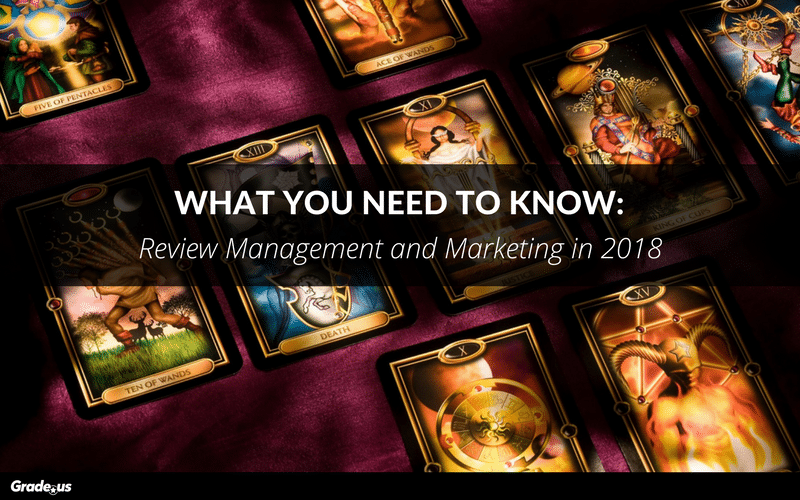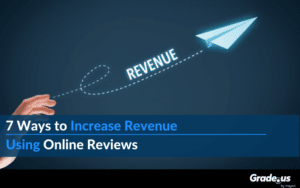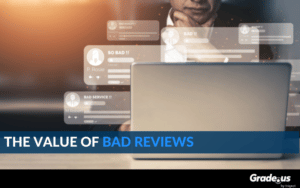Time magazine has some advice for you.
Don't trust reviews.
Their inflammatory article states you shouldn't trust positive or negative reviews. Time's reasoning goes something like this:
"By outing dubious, planted, solicited, and otherwise inauthentic reviews, consumers will have more reason to trust the reviews that remain, the thinking goes. But judging on how prevalent the manipulation seems to be, it’s arguable that online user ratings and reviews are less trustworthy than ever."
They've published articles like these before.
To be fair, they're not suggesting there's something inherently wrong with reviews themselves. Their message seems to be focused on the corruption and manipulation of reviews that's prevalent in many (most?) industries.
Are reviews becoming less important in 2018?
It certainly sounds that way, doesn't it?
On the surface, this seems like a reasonable argument. There's just one problem with Time's doom and gloom scenario though.
Customers aren't buying it.
When it comes to online reviews customers make their own decisions. As a whole, they don't seem to agree with Time magazine's opinion of online reviews. Which makes sense when you realize the online review ecosystem continues to evolve.
Most organizations aren't prepared.
Are you?
Here's how online review management and marketing is changing in 2018.
#1: Online reviews continue to grow in popularity
Data from the Pew Research Center shows A full 82 percent of U.S. adults rely on reviews before making a purchase. 50 percent of adults rely on reviews routinely to identify their brands of choice.

The data shows reviews are more popular than ever!
Here's the interesting part.
That number continues to climb as (a.) inexperienced groups (i.e. seniors) become more familiar/comfortable with online shopping.
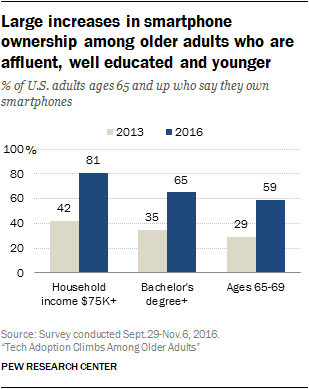
What this means for your online reviews
Data shows customers want more reviews from your business. They want clear, trustworthy, helpful and objective reviews from unbiased 3rd parties.
Which is fair, right?
If your review portfolio is deficient the time to fix it is now. Businesses with strong review portfolios and great local content will win more customers and sales as time goes on. Businesses with weak review portfolios will find it harder to attract and keep new customers.
They'll continue to fall behind as customer demands increase.
#2: Customers are becoming smarter
What if I told you that in 2012, the average shopper was smarter than 95 percent of the population in the 1900s? Would you believe it?
It's completely true.
The average IQ in modern societies around the world has risen consistently as people do their best to keep up with the demands and complexity of modern life.
It's called the Flynn effect.
While there's debate about the cause of this IQ increase, one thing is clear: People in modern societies have to be smarter. It's incredibly difficult to deal with the information overload that follows if we aren't intellectually capable.
Neato.
What does this have to do with online reviews?
Everything.
Researchers say most people can't spot a fake review. Researchers at Cornell University created software to identify what they call "opinion spam" also known as, fake online reviews. Their software got it right 90 percent of the time.
Regular people not so much.
Their results were about as accurate as a coin toss, which isn't very promising. I certainly didn't believe it, so I decided to try it for myself.
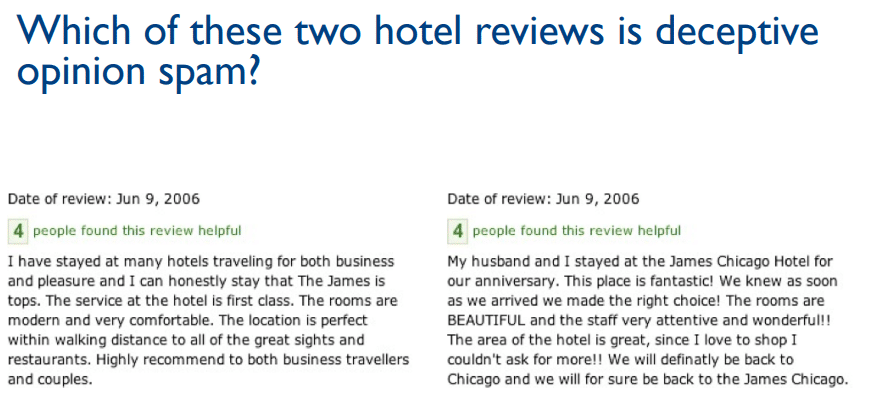
Which one did you choose?
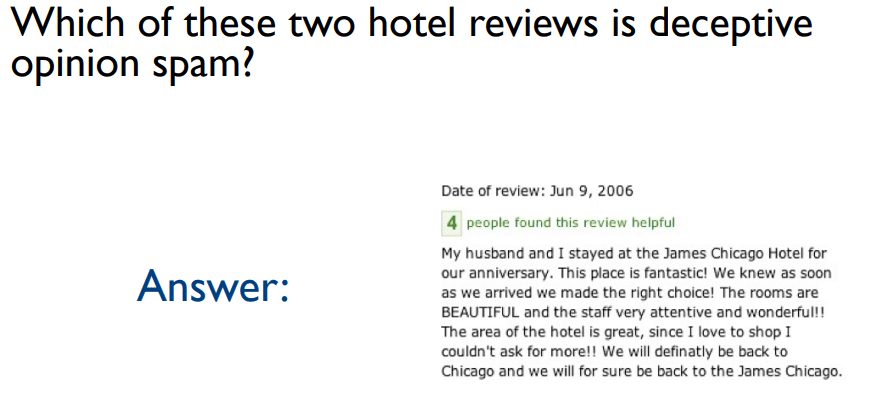
Was it this one?
If you're like most people you got it wrong (I got it wrong too). But then I realized why. We weren't given all of the information.
Here's why.
Sophisticated customers aren't focused exclusively on the review itself. Instead customers...
- Read a variety of reviews before choosing to trust a particular business
- Use context to determine whether reviews are treated with acceptance or skepticism
- Create and share a list of rules and routines to validate or falsify reviews
- Swap stories and share brand experiences with other customers
The Flynn effect is an indicator.
In this case, customers are forced to create ingenious strategies and resourceful tactics to vet online reviews. Shopping complexity has forced customers to adapt.
Your customers are getting smarter.
- Fail to honor your guarantee? Customers share that information.
- Is your customer service or refund process a nightmarish ordeal? Word travels fast.
- Are you a legendary business that produces extraordinary results? Reviews reflect performance.
How do I know?
Fraud.
In the early days of the internet, customers were routinely scammed by cyber criminals. These days it's much, much harder to deceive a large number of customers. We're far more skeptical than we used to be.
What this means for your online reviews
#3: Online reviews and the coming artificial intelligence war
Dan Ariely, in his book, The Honest Truth About Dishonesty shares an interesting quote:
"One percent of people will always be honest and never steal," the locksmith said. "Another one percent will always be dishonest and always try to pick your lock and steal your television.
And the rest will be honest as long as the conditions are right - but if they are tempted enough, they'll be dishonest too.
Locks won't protect you from the thieves who can get in your house if they really want to. They will only protect you from the mostly honest people who might be tempted to try your door if it had no lock"."
Customers crave honesty but expect lies.
The sad truth is that lying is easy. We've all done it. What's ironic about this is that we're drawn to truth tellers. Businesses that do what we can't or won't. The ones who dare to tell us the truth. They attract our attention and win our loyalty.
Customers are getting smarter. They're getting better at sniffing out dishonesty.
Be the one percent.
Build an exceptional business that behaves and communicates honestly. It's tough. But it's also the secret to amazing reviews.
Researchers at the University of Chicago taught a neural network to create fake online reviews. They used legitimate reviews on Yelp to teach their neural network. Then they surveyed thousands of users on Amazon's Mechanical Turk to see if they could tell the difference.
They couldn't.
That's not surprising given the details I mentioned earlier.

Here's what is surprising. Big manufacturers are using machine learning and neural networks (e.g. IBM's Watson) to detect fake reviews. Retailers, review platforms, social networks, etc. are already working towards the same goal: using AI to detect the fake reviews that come from ads like these.
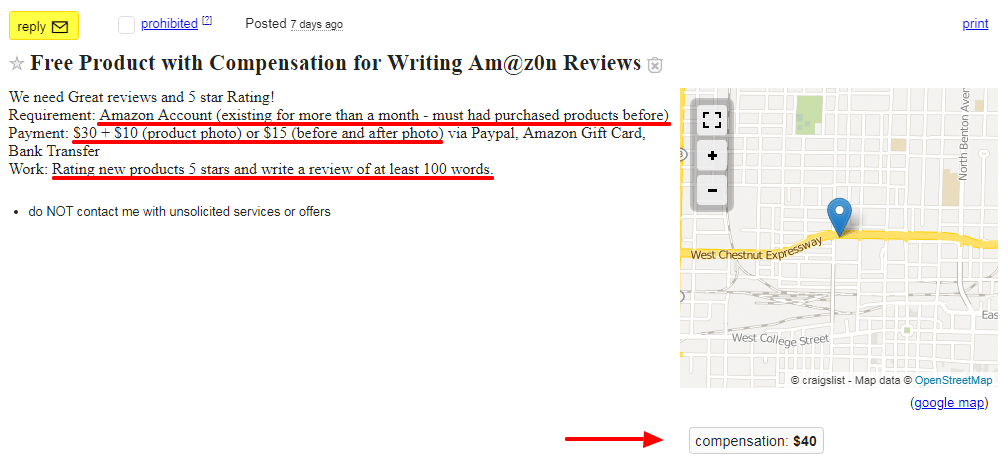
What this means for your online reviews
Reviews like these will soon become a thing of the past. As AI and machine learning becomes a more mainstream option, 3rd party retailers will hop on board as well. Here's what this means for you.
A purge is coming.
Soon these changes will trickle down to small and medium businesses. Organizations with a large number of fake reviews will see their three, four and five star reviews vanish, seemingly overnight as they're flagged and removed. Sellers can expect these changes to become more aggressive as AI becomes more mainstream.
The purge will be devastating.
1. Businesses with fake reviews will be exposed publicly
2. Customers will begin avoiding these dishonest businesses
3. The purge will decimate traffic and conversion rates
The time to build an outstanding review portfolio is now. Businesses with a fake review portfolio will eventually fade away. Businesses with a poor review portfolio will be left behind.
Reviews are more important in 2018
Online reviews are growing. They're more significant to customers. Time magazine, academic researchers - they'd have you believe that you're completely incapable of spotting a fake review.
They're only half right.
As customers, we're not always the best at identifying fake reviews, but we learn. We use experience, context and specificity to find what's true. With fake news, we learned to rely on Consumer Reports, Snopes.com and other truth tellers. We vetted reports via Google. We created our own systems and procedures to find the truth.
Online reviews are no different.
Time magazine says you shouldn't trust online reviews. What they're really saying is not to trust yourself. Just because you get it wrong doesn't mean you're incapable of getting it right.
Trust reviews, then use your experience to verify.
About the Author
Andrew McDermott
Andrew McDermott is the co-founder of HooktoWin. He shows entrepreneurs how to attract and win new customers.

